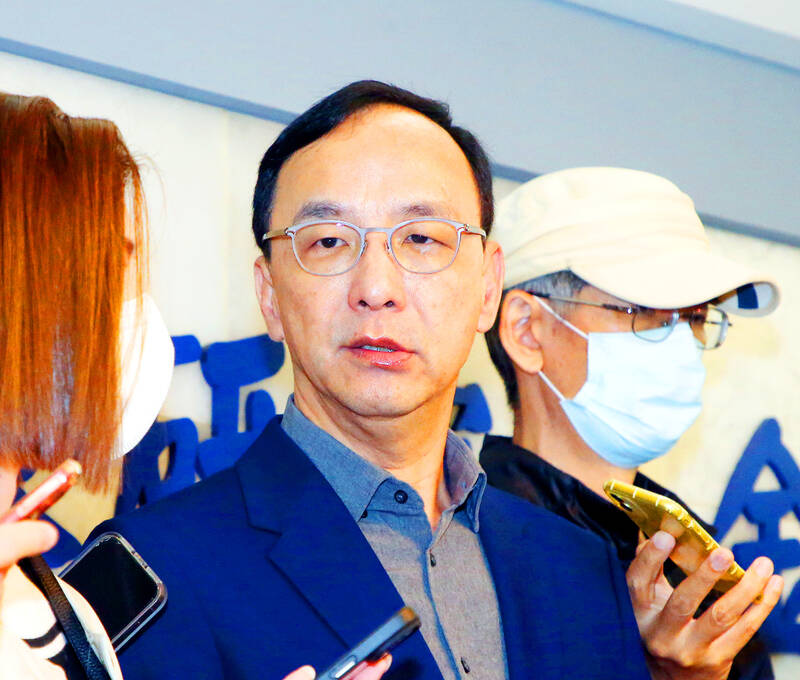Chinese Nationalist Party (KMT) Chairman Eric Chu (朱立倫) yesterday said that he agreed with the stance of former president Ma Ying-jeou (馬英九) regarding the so-called “1992 consensus,” and that Ma’s trip to China demonstrated that both sides of the Taiwan Strait should strive to seek common ground while setting aside differences.
Ma on Friday ended a 12-day trip to China, saying that he had shown that cross-strait exchanges and dialogue were achievable by sticking to the “1992 consensus.”
The “1992 consensus” refers to a tacit understanding between the KMT and the Chinese Communist Party (CCP) that both sides of the Strait acknowledge there is “one China,” with each side having its own interpretation of what “China” means.

Photo: CNA
The Democratic Progressive Party does not acknowledge the existence of the “consensus.” Former Mainland Affairs Council chairman Su Chi (蘇起) in 2006 admitted that he made up the term in 2000 to break the cross-strait deadlock and alleviate tension.
However, Ma made multiple mentions of the Republic of China (ROC) and the Constitution during his travels in China, saying that he was a former president of the ROC, Chu said.
Some people in the pan-green camp have chosen to be blind and deaf to such instances, Chu said.
“Maybe our friends in the pan-green camp see the ROC as a pro-Taiwan, independent ROC, and seek to undermine the entirety of the ROC without acknowledging that the ROC Constitution still exists,” he said.
After Ma on his trip said that “both Taiwan and the mainland are the Republic of China, both are China,” President Tsai Ing-wen (蔡英文) responded by saying that the remarks were anachronistic.
However, Tsai should brush up on the Constitution and the Act Governing Relations Between the People of the Taiwan Area and the Mainland Area (台灣地區與大陸地區人民關係條例), Chu said.
As president, Tsai should lead by example and abide by the Constitution, he added.
Ma defined the country using the ROC Constitution, and one cannot ask for more, KMT Legislator Johnny Chiang (江啟臣) said on Friday.
There is no doubt that Ma’s “one China” rhetoric in China referred to the ROC, KMT Legislator Hung Meng-kai (洪孟楷) said.
We should not say that we are willing to respect the US’ “one China” policy while not respecting Ma’s, Hung said.
Ma’s trip was one “that sought to avert war,” and it is an “improved version” of the “1992 consensus,” KMT Legislator Lin Wei-chou (林為州) said.

CHANGING LANDSCAPE: Many of the part-time programs for educators were no longer needed, as many teachers obtain a graduate degree before joining the workforce, experts said Taiwanese universities this year canceled 86 programs, Ministry of Education data showed, with educators attributing the closures to the nation’s low birthrate as well as shifting trends. Fifty-three of the shuttered programs were part-time postgraduate degree programs, about 62 percent of the total, the most in the past five years, the data showed. National Taiwan Normal University (NTNU) discontinued the most part-time master’s programs, at 16: chemistry, life science, earth science, physics, fine arts, music, special education, health promotion and health education, educational psychology and counseling, education, design, Chinese as a second language, library and information sciences, mechatronics engineering, history, physical education

The Chinese military has boosted its capability to fight at a high tempo using the element of surprise and new technology, the Ministry of National Defense said in the Quadrennial Defense Review (QDR) published on Monday last week. The ministry highlighted Chinese People’s Liberation Army (PLA) developments showing significant changes in Beijing’s strategy for war on Taiwan. The PLA has made significant headway in building capabilities for all-weather, multi-domain intelligence, surveillance, operational control and a joint air-sea blockade against Taiwan’s lines of communication, it said. The PLA has also improved its capabilities in direct amphibious assault operations aimed at seizing strategically important beaches,

‘MALIGN PURPOSE’: Governments around the world conduct espionage operations, but China’s is different, as its ultimate goal is annexation, a think tank head said Taiwan is facing a growing existential threat from its own people spying for China, experts said, as the government seeks to toughen measures to stop Beijing’s infiltration efforts and deter Taiwanese turncoats. While Beijing and Taipei have been spying on each other for years, experts said that espionage posed a bigger threat to Taiwan due to the risk of a Chinese attack. Taiwan’s intelligence agency said China used “diverse channels and tactics” to infiltrate the nation’s military, government agencies and pro-China organizations. The main targets were retired and active members of the military, persuaded by money, blackmail or pro-China ideology to steal

DEADLOCK: As the commission is unable to forum a quorum to review license renewal applications, the channel operators are not at fault and can air past their license date The National Communications Commission (NCC) yesterday said that the Public Television Service (PTS) and 36 other television and radio broadcasters could continue airing, despite the commission’s inability to meet a quorum to review their license renewal applications. The licenses of PTS and the other channels are set to expire between this month and June. The National Communications Commission Organization Act (國家通訊傳播委員會組織法) stipulates that the commission must meet the mandated quorum of four to hold a valid meeting. The seven-member commission currently has only three commissioners. “We have informed the channel operators of the progress we have made in reviewing their license renewal applications, and